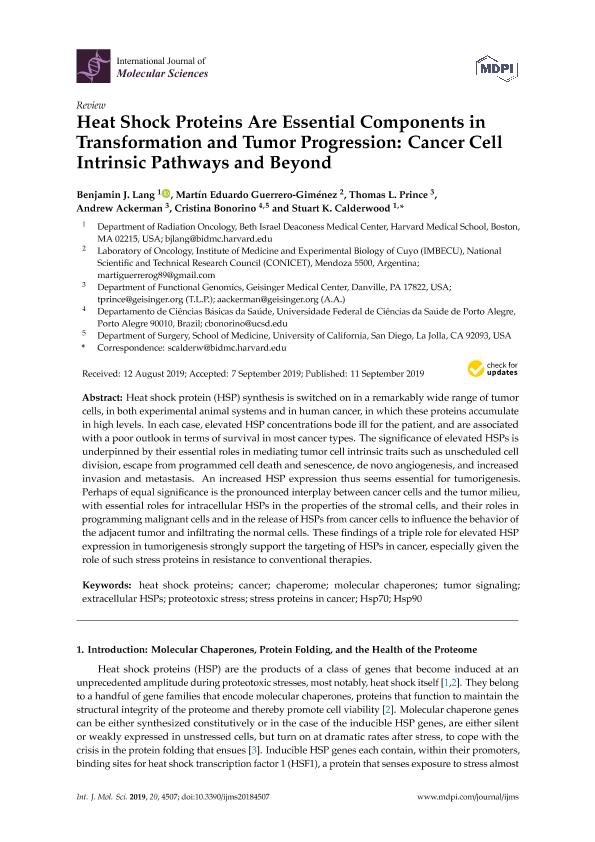Mostrar el registro sencillo del ítem
dc.contributor.author
Lang, Benjamin J.
dc.contributor.author
Guerrero Gimenez, Martin Eduardo

dc.contributor.author
Prince, Thomas L.
dc.contributor.author
Ackerman, Andrew
dc.contributor.author
Bonorino, Cristina
dc.contributor.author
Calderwood, Stuart K.
dc.date.available
2020-07-07T20:07:15Z
dc.date.issued
2019-09
dc.identifier.citation
Lang, Benjamin J.; Guerrero Gimenez, Martin Eduardo; Prince, Thomas L.; Ackerman, Andrew; Bonorino, Cristina; et al.; Heat shock proteins are essential components in transformation and tumor progression: Cancer cell intrinsic pathways and beyond; Institute for Digital Multidisciplinary Publication; International Journal of Molecular Sciences; 20; 18; 9-2019; 1-26
dc.identifier.issn
1661-6596
dc.identifier.uri
http://hdl.handle.net/11336/109058
dc.description.abstract
Heat shock protein (HSP) synthesis is switched on in a remarkably wide range of tumor cells, in both experimental animal systems and in human cancer, in which these proteins accumulate in high levels. In each case, elevated HSP concentrations bode ill for the patient, and are associated with a poor outlook in terms of survival in most cancer types. The significance of elevated HSPs is underpinned by their essential roles in mediating tumor cell intrinsic traits such as unscheduled cell division, escape from programmed cell death and senescence, de novo angiogenesis, and increased invasion and metastasis. An increased HSP expression thus seems essential for tumorigenesis. Perhaps of equal significance is the pronounced interplay between cancer cells and the tumor milieu, with essential roles for intracellular HSPs in the properties of the stromal cells, and their roles in programming malignant cells and in the release of HSPs from cancer cells to influence the behavior of the adjacent tumor and infiltrating the normal cells. These findings of a triple role for elevated HSP expression in tumorigenesis strongly support the targeting of HSPs in cancer, especially given the role of such stress proteins in resistance to conventional therapies.
dc.format
application/pdf
dc.language.iso
eng
dc.publisher
Institute for Digital Multidisciplinary Publication
dc.rights
info:eu-repo/semantics/openAccess
dc.rights.uri
https://creativecommons.org/licenses/by-nc-sa/2.5/ar/
dc.subject
CANCER
dc.subject
CHAPEROME
dc.subject
EXTRACELLULAR HSPS
dc.subject
HEAT SHOCK PROTEINS
dc.subject
HSP70
dc.subject
HSP90
dc.subject
MOLECULAR CHAPERONES
dc.subject
PROTEOTOXIC STRESS
dc.subject
STRESS PROTEINS IN CANCER
dc.subject
TUMOR SIGNALING
dc.subject.classification
Biología Celular, Microbiología

dc.subject.classification
Ciencias Biológicas

dc.subject.classification
CIENCIAS NATURALES Y EXACTAS

dc.title
Heat shock proteins are essential components in transformation and tumor progression: Cancer cell intrinsic pathways and beyond
dc.type
info:eu-repo/semantics/article
dc.type
info:ar-repo/semantics/artículo
dc.type
info:eu-repo/semantics/publishedVersion
dc.date.updated
2020-06-30T14:18:48Z
dc.journal.volume
20
dc.journal.number
18
dc.journal.pagination
1-26
dc.journal.pais
Suiza

dc.journal.ciudad
Basel
dc.description.fil
Fil: Lang, Benjamin J.. Harvard Medical School; Estados Unidos
dc.description.fil
Fil: Guerrero Gimenez, Martin Eduardo. Consejo Nacional de Investigaciones Científicas y Técnicas. Centro Científico Tecnológico Conicet - Mendoza. Instituto de Medicina y Biología Experimental de Cuyo; Argentina
dc.description.fil
Fil: Prince, Thomas L.. Geisinger Medical Center; Estados Unidos
dc.description.fil
Fil: Ackerman, Andrew. Geisinger Medical Center; Estados Unidos
dc.description.fil
Fil: Bonorino, Cristina. Universidade Federal de Ciências da Saúde de Porto Alegre; Brasil. University of California; Estados Unidos
dc.description.fil
Fil: Calderwood, Stuart K.. Harvard Medical School; Estados Unidos
dc.journal.title
International Journal of Molecular Sciences
dc.relation.alternativeid
info:eu-repo/semantics/altIdentifier/url/https://www.ncbi.nlm.nih.gov/pubmed/31514477
dc.relation.alternativeid
info:eu-repo/semantics/altIdentifier/doi/http://dx.doi.org/10.3390/ijms20184507
Archivos asociados
